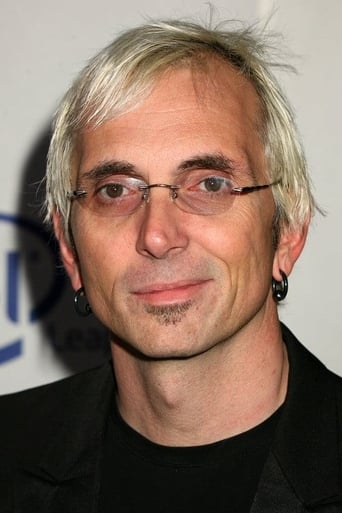VividSimon
Simply Perfect
Rijndri
Load of rubbish!!
Kidskycom
It's funny watching the elements come together in this complicated scam. On one hand, the set-up isn't quite as complex as it seems, but there's an easy sense of fun in every exchange.
Erica Derrick
By the time the dramatic fireworks start popping off, each one feels earned.
atlasmb
If you accept the idea that a documentary should document, without bias or agenda, this film was a flop. It is very deeply flawed due to its methodology.I was pleasantly surprised by the four reviews here that preceded mine. None of them fell for the "arguments" of this film. I agree with almost all of what the other reviewers wrote. One said that viewers should watch the film with their thinking caps on. Failure to watch with a critical eye might lead someone to fall for some of the faulty logic in Adult Entertainment which, as another wrote, is similar to Reefer Madness.At the beginning, it seemed like the filmmaker had intentions of presenting a balanced and logical view. But quickly, the film veers into logical mistakes, poor methodology and bias.The "experts" are well chosen. But the film does not challenge their glaring inconsistencies and hyperbolic rhetoric. The landscape of these experts' analyses is on shaky ground, with terms being used loosely and opinions being presented as scientifically supported "facts". Terms like "obsession" and "addiction" are mixed together and their meanings are muddled by the words "crisis" and "compulsion". Causes and correlations are confused.The filmmaker wonders if the "addiction" approach is an end-around by those who wish to avoid the free speech issues. But he allows them to take that tack anyway.The film does contain some humor. The light approach makes the film watchable (and not totally laughable like Reefer Madness). The inherent bias is not as absurd as in a Michael Moore film.In the end, the film does not place enough responsibility on parents. It looks to the government for all its solutions.In one part, the sophistry amounts to the equation $ = power = bad. If the sex industry is big, it must be bad.The subjects used in the "study" conducted by the filmmaker were a single guy and a married couple. Three people. Should we questions the results because of sample size? Duh. Some of the survey questions they were asked were peppered with absolutes, e.g. "All women..." This skews the results so they are easily misunderstood by non-professionals.Arguments presented by the filmmaker and interviewees included many questionable premises, like "marriage is good" and "couples should tell each other about everything they think and experience".At one point, they discuss The Big Question. Well the real Big Question is: "WHO do you want to tell you what you can do?"The consortium of these sexual prohibitionists wants the government to dictate what is sexually "healthy", presumably because they know better than you do what is best for you. Thankfully, some of the therapists understand the bigger picture--that this is an issue of individual freedom. But even one guy who understands that still thinks we should leave it to the "community" to decide what is best for the individual, not the individual himself. The concept of "community standards" is just a smaller version of the unconstitutional idea of the government voiding individual freedoms. Were the Salem Witch Trials any better than the McCarthy Hearings just because they were on a local level?
poeticdespair-456-9995
I have always enjoyed documentaries that touch on taboo social subjects, so when I came across this film on Netflix, I had to watch it. It primarily delivered what I was expecting - that is, a number of sides positing arguments for and against the pornographic industry. I was, however, surprised that it didn't go in some of the directions I was expecting it to when I first began watching, such as highlighting violence and drug use in the sex industry. Those subjects were slightly touched upon, but for the most part, the focus of the movie dealt with the question of whether or not viewing pornography was harmful to mental health - and mental health was often treated as an amorphous concept.The film centers on a study conducted on a single male and a married couple...and this hacked study is where the film fails. A previous reviewer noted that the study did not include females or homosexuals, which makes the study unscientific. I'd argue that there is nothing wrong with obtaining a homogeneous sample, so as long as results weren't generalized to a heterogeneous population. The narrator refers to the study as an "expirement" throughout the movie, when in actuality, it's a quasi-experiment...or a really bad unfinished repeated-measures design if you want to give it a little more credit. It may seem like I'm splitting hairs over semantics, but the fact that the study is a quasi-experiment - that is, there is no control group (or with this obscenely low sample size, control participant) - is incredibly important to being able to infer any amount of causality to the treatment, the treatment being exposure to pornography. The participants are given a pretest survey and are then exposed to porn for 30 days. After which, they are given a post test survey and are placed into a control period; then they are given an exit survey. The problem is that within those 30 days, a number of things could have taken place that would have affected the participants' post test results. Social scientists refer to these things as threats to internal validity. The idea of an experiment is that the control group will also experience these confounding factors, but the investigator will be able to parse out the difference in post test scores due to the treatment and due to the spurious factor. In short, the results at the end of the movie were interesting, but take them with a grain of salt, especially considering the sample size. It's also worth noting that in the real world, if any self-respecting internal review board caught wind that (potential spoiler alert) the investigators prompted a married man to go into a private booth with a lap dancer as part of a study, especially without the ability to opt out, the study would be halted and the investigators would be kicked out of their institutions and spend the rest of their careers busing tables to fast it would make their heads spin.But what about the rest of the movie? The interviews were interesting to say the least. While we're on the subject of social science, many of the interviewees make giant claims of pornography's affect on individuals and society without actually moving beyond correlation. I could forgive this a little bit if it were the layperson making these claims, but many of these people have doctorates. They should know better. "Correlation doesn't equal causation" is a maxim that's drilled into every student's head who's taking an undergrad level research methods of stats course. To be fair, that can't be held against the filmmakers. Interesingly, Ron Jeremy was one of the most reasonable people interviewed. My favorite interviewee, however, was Sharon Mitchell. She's a former porn actress who now runs a clinic to test participants in the porn industry for STDs. She was frank about the porn industry without being judgmental. Plus, it was funny to hear this founder of a clinic talk like a sailor at times. The singer and guitarist of Everclear even makes an experience, shamefully discussing his addiction to pornography.All in all, I dug the movie. I just would wince a bit whenever the narrator would take the study seriously. Obviously, most of the interviewees were interested in pushing an agenda. If you're like me and have an intellectual interest in the porn industry, I recommend this film. Just be sure to put on your critical thinking cap before you start watching.
popculturejunkie1975
This documentary attempts and pretends to show a controlled experiment on the effects of porn on those who watch it. It starts out as though it will be objective in it's application of said experiment, however by the end you'll find that it was mostly catered to come to a predetermined conclusion, that porn adversely effects those who watch it. The main "scientific experiment" that is conducted consists of one heterosexual male, and one heterosexual couple. Each male (and only the male)is required to watch and partake in a set of various erotic and sexual mediums, including videos, magazines, internet sites, sex shops and clubs, over a 30-day period. They are also given questionnaires throughout that period to fill out as part of the study. One major problem, only the males partake in the "porn", the wife takes no part in experiencing it. So it's not a couple experiencing it together, but a husband watching and partaking in the erotic mediums. And then the wife dealing with it separately. They also completely avoid having a single female involved in the experiment, or having any homosexual individuals or couples to take part in viewing pornography. If that's not a skewed scientific experiment, I don't know what is. The rest of the film consists of small edited interviews with various "experts" of human sexuality, that are simply weighed toward the conclusion that pornography has adverse effects. And finally that the government should step in and require the porn industry to pay more taxes on their profits to pay for sex education(leaning toward abstinence only) and sex addiction therapy! No mention of pornography effects in other parts of the world either. Horrible documentary
beautiful_suburban_midnight
Though it started out as an interesting documentary, it fast became a "DON'T LOOK AT PORN" and "THIS IS BAD." and there were so many different routes that the filmmaker could have gone down but ignored.For example, as much as he spoke about women's degradation and spoke to women who viewed porn as evil and disgusting, he failed to speak to women who enjoy porn. Not to mention the entire homosexual population. The only mention that gays got at all was a bookshop owner talking about buttplugs, and a few mentions here and there when talking about porn scenes. It could've been so much more, but ended up feeling like a 50's propaganda piece.




